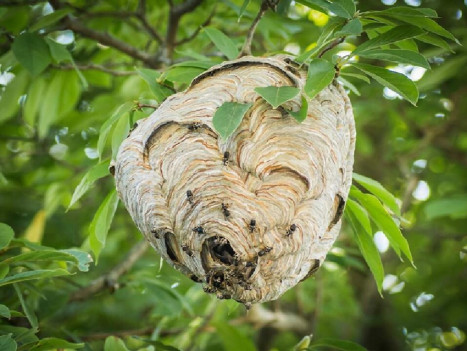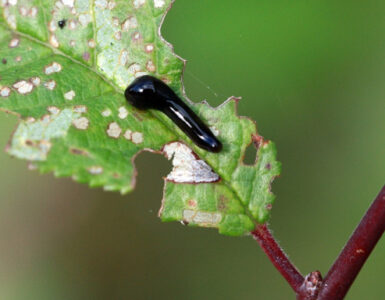Have you ever been outside when you suddenly notice a buzzing sound coming from up high? You glance around nervously and spot a large nest teeming with bald-faced hornets.
Bald-faced hornets build their nests in bushes and trees [1]. They may also make it on the outside of buildings.
But don’t worry; in this article, you’ll learn how to control these stinging insects using home remedies and more.
Dangers of Bald-Faced Hornets
The colonies of these wasps can contain 100 and 400 members. They become more active and aggressive when defending their nests.
Getting too close can also prove dangerous. The stings of these wasps are painful, and the venom can cause life-threatening allergic reactions in some people [2].
How to Get Rid of Bald-Faced Hornets Naturally
The best way to avoid getting stung is to steer clear of their nesting areas. Also, never provoke the wasps by throwing objects at or disturbing their nests.
These insects are beneficial predators of garden pests when their nests are located away from human activity. However, if a nest is built in an area where it poses a risk, it is best to have it removed by a professional exterminator to avoid being attacked.
Below are some home remedies and organic methods you can try to help keep them away.
1. Close Off Entry Points
Go outside and inspect the area around where you’ve seen the hornets entering and exiting. Look for any cracks or holes in foundations, siding, attics, crawl spaces, and eaves where they could be getting in.
Once you spot an entry point, seal it up. However, if the opening leads into a wall void or attic, you may need to hire an exterminator to treat the inside to kill the colony.
Blocking access and closing up any cracks or crevices is an easy DIY method to get rid of a bald-faced hornet problem around your home. By eliminating their access, you’ll force them out in a humane way.
2. Keep Garbage Cans Clean and Tightly Sealed
These flying insects are attracted to open garbage cans, which provide easy access to the food waste and debris on which they feed.
Therefore, be sure that all garbage cans, compost bins, and recycling containers have lids that fit tightly and seal completely.
3. Trim Vegetation
Keeping the vegetation around the house trimmed is one of the best ways to deter bald-faced hornets from building nests near your home.
These stinging pests are attracted to overgrown, brushy areas. Mow your grass, keep bushes trimmed, and prune shrubs. Doing this gets rid of places where bald-faced hornets might build nests.
4. Soap and Water
One popular home remedy to control bald-faced hornets is to make a soap-and-water solution. Fill a 1-liter spray bottle with water and add two tablespoons of dish soap.
Spray the soap solution directly on any hornets you see, especially those entering or exiting the nest. The soap will immobilize and kill the hornets not long after.
You can also add a cup of dish soap to a gallon of water and use the soapy water to drench their nests. This method is handy for eliminating small wasp nests.
It’s also best to spray the nest at night, as bald-faced hornets are less active during that time.
5. Hang a False Wasp Nest by Your House
Hang a fake wasp nest near areas where you see these insects flying around. The idea is that the hornets will see the phony nest as competition and build elsewhere.
You can purchase a commercial fake wasp nest that resembles an actual nest.
Alternatively, you can construct your own using brown paper bags. Stuff the bags with newspaper to give them shape and reinforce the entrance.
Attach the fake nest under the eaves of your house, in trees, or on fences where you’ve seen bald-faced hornet activity. These pests are territorial and will build somewhere else if they spot a nest already in the area.
6. Repellent Herbs
Using natural repellents around your home can deter bald-faced hornets organically. Planting certain herbs around decks, patios, and play areas creates an unpleasant aroma that keeps the wasps away.
Some of the most effective herbs that repel bald-faced hornets include mint, pennyroyal, lemongrass, basil, rosemary, lavender, and thyme.
The strong fragrance of these plants repels these and other stinging insects. You can also crush the leaves to release their natural oils and place them around entry points.
7. Essential Oils
As a natural DIY approach, you can also use essential oils with a strong scent to keep hornets away.
The pungent smell will make the location undesirable, forcing them to look for a new nesting spot elsewhere.
Some of the most effective essential oils for this purpose include geranium, lemongrass, and clove.
Use them to make a homemade bald-faced hornet spray. Just mix 10 drops of each oil in a spray bottle and carefully spray the nests that are already established.
You can also spray it in areas where they frequent to prevent them from building nests.
8. Diatomaceous Earth
Diatomaceous earth kills insects by dehydrating them. It is also very effective against hornets.
Apply diatomaceous earth in dry, powdered form around the entrance of ground nests. You can also pour it in.
The powder will stick to the hornets when they emerge from or return to the nest, dehydrating and killing them.
9. Homemade Trap
Making your own hornet trap is easy. You’ll need a soda bottle, one cup of apple cider vinegar, half a cup of sugar, a teaspoon of dish soap, and pieces of string.
Cut off the top third of the bottle and drill a few holes near the rim to attach the strings. Next, mix the vinegar, sugar, and dish soap until the sugar completely dissolves.
Now pour the solution into the bottle. Finally, hang this homemade bald-faced hornet trap in places where you’ll likely find the hornets.
Once the hornets get in for the treat, the soap will coat their wings and prevent them from flying out.
10. Dr. Earth Final Stop Pest Control Killer Spray
This product is an organic insecticide that kills bald-faced hornets on contact. It uses essential oils, including garlic, cinnamon, thyme, and peppermint.
Dr. Earth Final Stop Pest Control Killer Spray works by suffocating the hornets upon direct contact. The oils coat their bodies and block their breathing pores, leading to rapid death.
You can also use it to control chiggers, moths, gnats, centipedes, and other insects.
Takeaway
So there you have it! Use these natural pest control methods to keep bald-faced hornets away from your property.
Give some of these eco-friendly options a try before resorting to harsh chemicals. With a bit of patience and persistence, you’ll be enjoying your yard with little or no hornets.








They come to my oriole feeders and hummingbird feeders, especially yellow jackets. I’ve been stung a few times and chased by them. They’re sooo bad! Do I have to hang my hummingbird feeders elsewhere?